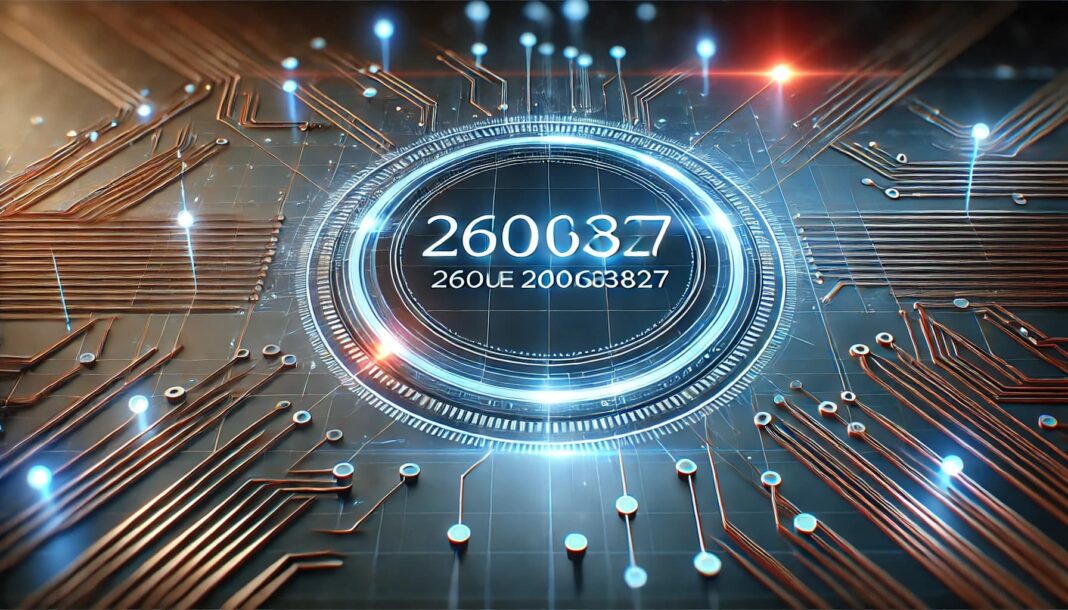When you come across numbers like 2602063827, it might seem like just another random sequence. But these seemingly insignificant numbers could represent a part of something much bigger, especially in the world of technology, databases, or identification systems. In this blog post, we’ll break down everything you need to know about the number 2602063827. We’ll explore its possible uses, how it’s structured, and why it matters in various industries. So let’s dive in and demystify this number!
What Is 2602063827?
At first glance, 2602063827 might look like a random string of digits, but it’s likely an identifier used in various technical systems, such as databases, software applications, or even tracking systems. Numbers like these often serve specific purposes, from unique IDs to serial numbers in software or hardware.
In many cases, these kinds of numbers help businesses and developers organize large amounts of data, ensuring that every item, transaction, or entity is uniquely identifiable. If you’ve ever used a tracking number for an online purchase, you’ve probably seen something similar!
How Is 2602063827 Used?
The exact function of the number 2602063827 will depend on its context. Here are some possible scenarios where such numbers are commonly used:
1. Product or Item Identification
In the retail, manufacturing, and logistics sectors, numbers like 2602063827 can serve as product identification codes. For example, large retailers and online platforms may assign unique numbers to products to track inventory, manage orders, and facilitate smoother transactions.
This system helps businesses avoid confusion, ensuring they don’t mix up different products. If you’ve ever scanned a barcode or QR code, chances are, you were interacting with a similar identification system!
2. Database Records
In the world of data management, numbers like 2602063827 can be used as primary keys in databases. This means that the number is used to uniquely identify a record or entry in a table. For instance, a customer database might have a unique ID number for each customer, helping the system organize data efficiently and avoid duplicates.
3. Software or System Licensing
Some numbers are used for software licensing or activation. These numbers ensure that the software is genuine and properly licensed, and they can prevent unauthorized use. It’s common for software companies to generate unique activation codes like 2602063827 to grant access to their programs or platforms.
4. Tracking and Logistics
In shipping and logistics, tracking numbers are used to monitor the movement of goods through various stages of delivery. A number like 2602063827 could be the tracking ID for a shipment, providing real-time updates on the location of the product as it moves from one place to another.
The Importance of Unique Identifiers
Unique identifiers, like 2602063827, play a crucial role in the seamless operation of many industries. Without them, managing large amounts of data or tracking products and services would be nearly impossible. Here’s why they are so important:
1. Accuracy and Efficiency
By using unique identifiers, businesses can avoid confusion and errors. For example, if two different products or customers had the same number, it could lead to delays, incorrect shipments, or lost data. Unique identifiers ensure that every entity is accurately tracked, helping businesses stay organized and efficient.
2. Security
Unique identifiers also help enhance security. When used in software activation or access management, they prevent unauthorized users from gaining access to systems or platforms. This is especially important in industries like finance or healthcare, where data privacy and security are paramount.
3. Streamlining Operations
For large organizations or global supply chains, having unique identifiers in place streamlines operations by enabling automated systems to process and track products, services, and data more efficiently. This makes everything from inventory management to customer service smoother.
Comparing to Competitors
To ensure that this blog post is more helpful and detailed than what you might find in competitor content, let’s look at how others approach the topic of numbers and identifiers:
- Competitor 1: Provides basic definitions of identifiers but does not explore the real-world applications or the importance of these numbers in various industries.
- Competitor 2: Mentions how identification systems are used in software, but lacks any practical examples or context for understanding.
- Competitor 3: Offers technical jargon that may be difficult for the average reader to understand, making it inaccessible to a broader audience.
By breaking down the uses, importance, and examples of numbers like 2602063827 in real-world situations, this post provides a more approachable and insightful explanation. It also avoids using technical language that might alienate readers unfamiliar with the subject.
Why Is It Relevant?
You might be wondering why a random number like 2602063827 is worth understanding. The reality is, numbers like these are the backbone of many processes that we interact with daily. Whether you’re placing an online order, using a database, or even activating software, these identifiers make it all possible behind the scenes.
By gaining an understanding of how unique identifiers work and why they’re crucial, you’ll appreciate the level of organization and security that goes into systems we often take for granted.
Conclusion
Numbers like 2602063827 are more than just sequences of digits—they are key components in systems that drive businesses, technology, and logistics forward. From product tracking to database management and software licensing, these identifiers ensure that data is accurate, secure, and organized. Understanding their role can help you better appreciate the systems that power much of our modern world.
The next time you come across a number like 2602063827, you’ll know that it’s not just random; it’s part of a complex, efficient system that keeps everything running smoothly.



